All Northwest teacher, leader, and counselor candidates upon completion demonstrate relevant content knowledge, pedagogical skills, and professional knowledge relevant to the degree for which they have been prepared. Northwest programs emphasize a balance between deep content knowledge and broad pedagogical skills.
This section of the QAR is divided into four subsections: the first addresses the rigorous coursework required in content knowledge, pedagogical skills, and professional knowledge; the second overviews GPA and MoGEA and MoCA test requirements; the third analyzes data collected on the summative MEES assessment for Standard 1; and the last analyzes First-Year Teacher Survey (FYTS) results regarding content knowledge.
All Northwest candidates are required to complete coursework in their content area(s). Generally, content-area courses are taken with the specific Northwest department or school in which the discipline is housed (e.g. candidates take math content courses in Northwest's School of Mathematics and Statistics). Further, all Northwest candidates take courses specific to pedagogical skill and professional knowledge; these courses are generally taken in the School of Education. Teacher preparation at Northwest is thus a collaborative effort across our schools and departments. More information about specific programs, the departments and schools that teach content, and the lists of content courses students take can be found in Table 1: Northwest Teacher & Leader Preparation Programs Summary. In addition, four-year plans and program of student information for all of Northwest's undergraduate programs can be found on the Four-Year Plans page of the Student Success Center website.
Northwest takes great pride in the emphasis on content knowledge, pedagogical inquiry and practice, and professional knowledge relevant to the student's degree program, which emerges through Northwest's conceptual frameworks. These ideas, concepts, and frameworks are emphasized and evaluated through multiple courses, assessments, and initiatives. The diligent work with these concepts begins with the development and continual refinement of curriculum across the Professional Education Unit (PEU). Additionally, as these curricular decisions are vetted through our shared on-campus governance, they are also examined and approved by the Missouri Department of Elementary and Secondary Education (DESE) through a review of the state-approved DESE matrices.
As required by the Rules of Department of Elementary and Secondary Education (DESE), all candidates seeking certification are required to meet minimum GPA requirements: they must have a 2.75 overall GPA, a 3.00 content GPA, and a 3.00 professional education GPA. Northwest's Teacher Education Student Services (TESS) office monitors individual candidates' GPAs and requires they meet these minimum requirements prior to admission to the professional education program. Northwest's Field Placement Coordinator checks individual candidates' GPAs again prior to student teaching to assure they meet the minimum requirements. Northwest also has processes in place that monitor GPA collectively as part of its overall continuous improvement plan. Teacher candidates within the School of Education in Spring 2019, for example, collectively averaged a 3.67 GPA in their major and a 3.82 in their professional education coursework.
In addition to these minimum state requirements, Northwest also requires, as does Missouri’s department of Elementary and Secondary Education (DESE), that teacher candidates must obtain a "C" or higher in all professional education courses. This helps to ensure that all teacher candidates have pedagogical and professional knowledge relevant to the degree or credential for which they are being prepared. These courses include theory study and practical application opportunities; by having both in most education courses, faculty ensure that in addition to content knowledge, teacher candidates have a solid understanding of fundamental pedagogical and professional knowledge and the capacity to apply that knowledge in their work with students.
As also required by DESE, all candidates seeking certification are further required to either pass the Missouri General Education Assessment (MOGEA) or score a composite score of twenty on the American College Test (ACT) prior to admission to the professional education program. In addition, candidates are also required prior to certification to pass the appropriate discipline-specific MOCA assessment relevant to the credential or degree for which they are prepared. Further, in addition to these minimum requirements, Northwest also requires that teacher candidates attempt the MOCA assessment prior to student teaching; most pass on this first attempt, but those that do not are then provided additional support from their advisor prior to student teaching. Northwest uses this rule to identify and provide additional supports to candidates who do not pass the MOCA on their first attempt while they are still on campus. These state assessments are one measure that ensure all Northwest candidates have the minimum content knowledge required for the degree or credential for which they have been prepared.
These metrics - GPA, MOGEA, ACT, MEES, and MOCA - are also shared with the Department of Elementary and Secondary Education (DESE), which serves as a secondary review for our continual growth purposes. The primary review is conducted annually by our program faculty and institutionally on a five-year rotation. Specific to DESE metrics (overall GPA, content specific GPA, Missouri Content Assessment Exam, and Missouri Educator Evaluation System data), these are reviewed by program leaders to verify the content specific relevance of what is being taught in the professional education courses and the content-specific courses. Once this data is pulled by our Assessment Director, it is shared with DESE and with the program coordinators. If there are problem areas that are isolated, the Assessment Director meets with the program coordinator to determine if changes need to be pursued in content and/or education-specific coursework. Additionally, the Dean of Education is alerted of the issues so he can work with the program's leaders to brainstorm and implement solutions to challenges.
The Missouri Department of Secondary and Elementary Education (DESE) has developed the Missouri Educator Evaluation System (MEES); composed of 36 quality indicators across nine standards, the system serves as both a formative and summative assessment tool for both teacher candidates in their clinical experiences as well as for practicing teachers in their schools. Northwest candidates are introduced to the tool in their phase one and phase two coursework. Northwest university supervisors and cooperating teachers then use the tool during student teaching, assigning each of the nine standards one score using a Teacher Candidate Assessment Rubric (TCAR). These two scores are then averaged and reported for each of the nine MEES standards to Northwest and DESE.
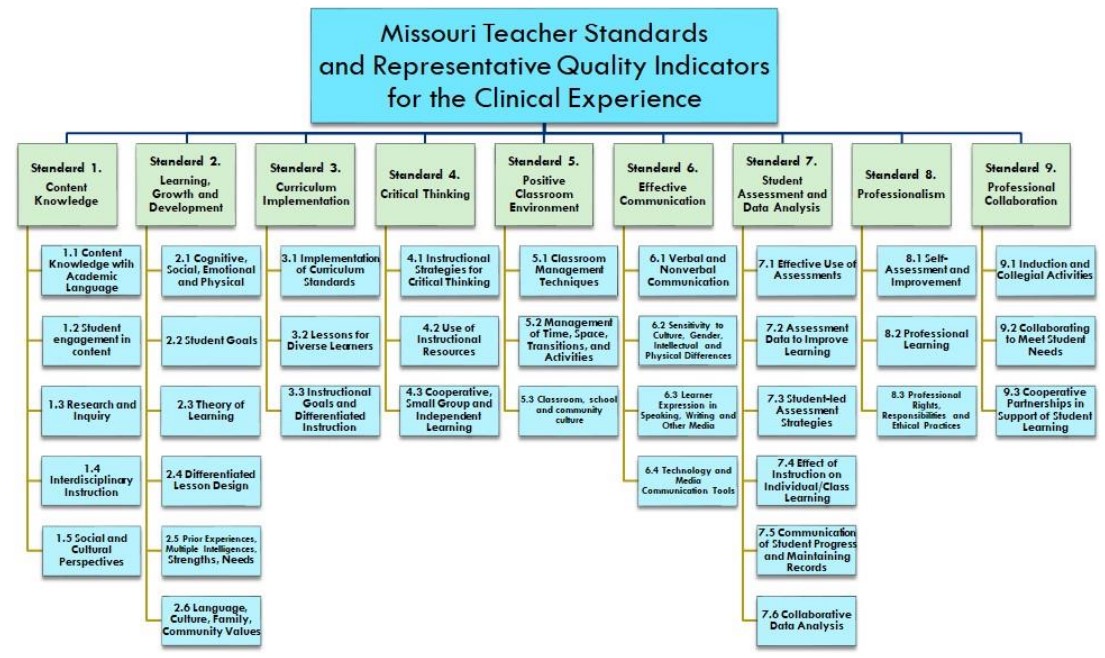
Northwest university supervisors and cooperating teachers use individual candidates' data to help them focus on areas where they can improve their teaching. University supervisors use the tool formatively on at least five observations before assigning a summative score. Northwest also uses collective candidate data to determine where programs can make improvements to better prepare future candidates. MEES data is disseminated by program to individual program coordinators, at School of Education unit meetings, and at PEU retreats. MEES Standard #1 explicitly addresses candidates' content knowledge and provides data on candidates' preparation regarding content knowledge. MEES Standard #1 (as well as the other eight MEES standards) have all been crosswalked throughout all of the university's education programs, as outlined in Table 3: Northwest State and National Educator Prep Standards Alignment.
As shown in the data below, Northwest candidates' performance on MEES Standard #1 compares favorably with the state average for 2018-19.
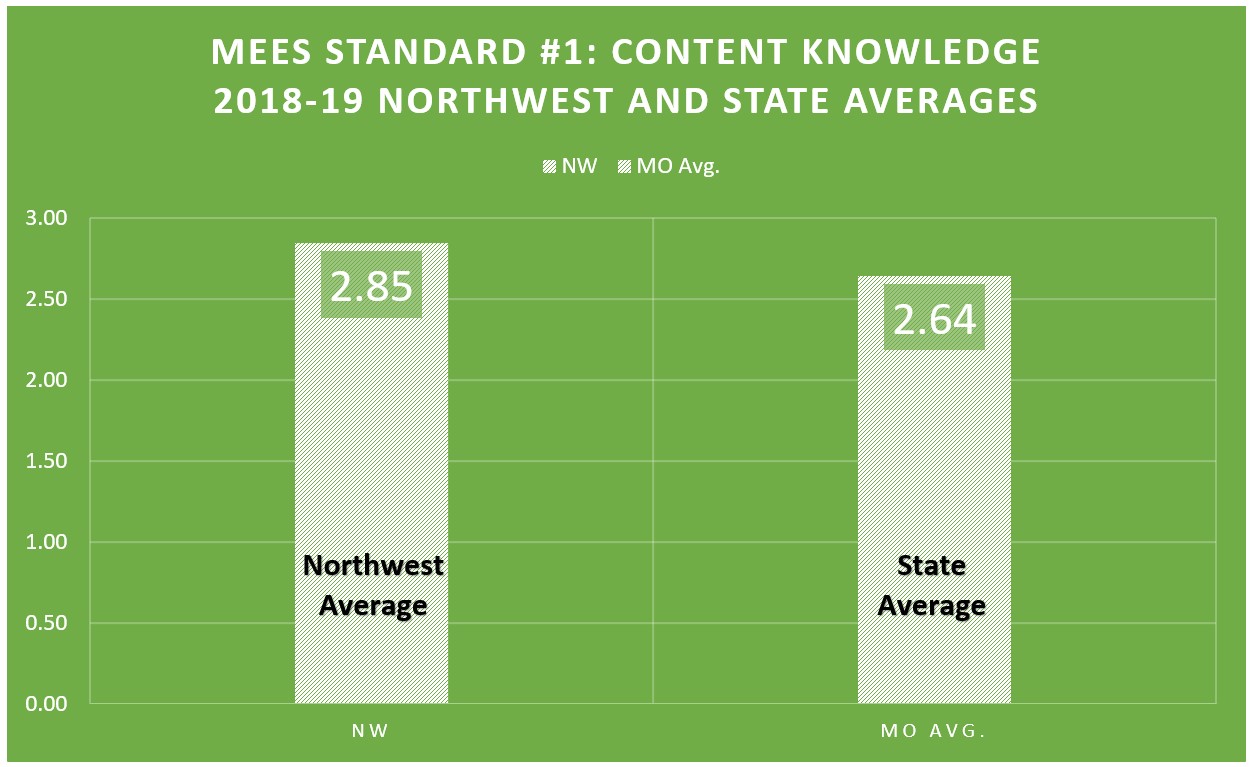
Please note: trend data from previous cycles is not shown because of recent changes to the MEES scoring system, which makes it difficult to compare visually; however it is worth noting that in 2017-18, Northwest performed favorably on MEES Standard #1 (content knowledge), with the third-highest ranking of 37 Missouri providers reporting APR data. Also, please note that 2019-20 data was not yet available when this report was composed, but Northwest looks forward to sharing that data with the site visit team in March. All MEES data in the quality assurance report comes from the state education agency, DESE.
Further information regarding Northwest candidates' performance on summative MEES assessments is available in later sections in this report:
The Missouri Department of Secondary and Elementary Education (DESE) has developed a suite of six surveys educators complete in their first year of employment, which DESE has been collecting since the 2015-16 academic year. These surveys were designed to evaluate the quality of program impact on the field and provide data to providers to support continuous improvement. The First-Year Teacher Survey (FYTS), taken by teacher, in alignment with MEES Standard #1, asks completers four questions after their first year of teaching to assess their preparation in content knowledge (FYTS questions 2-5). In addition, the First-Year Teacher Survey by principals (FYTS), taken by principal, which is completed by principals assessing Northwest teachers following their first year on the job, likewise has four similar questions regarding content knowledge (questions 1-4). In the first of these, as shown in the table below, 89% of completers in their first year and 87% of their principals "agreed" or "strongly agreed" that in their first year they were "prepared in [their] content area." In both cases, Northwest-prepared candidates perceived themselves and were also perceived by their administrators to be comparatively better prepared than first-year teachers at peer institutions.
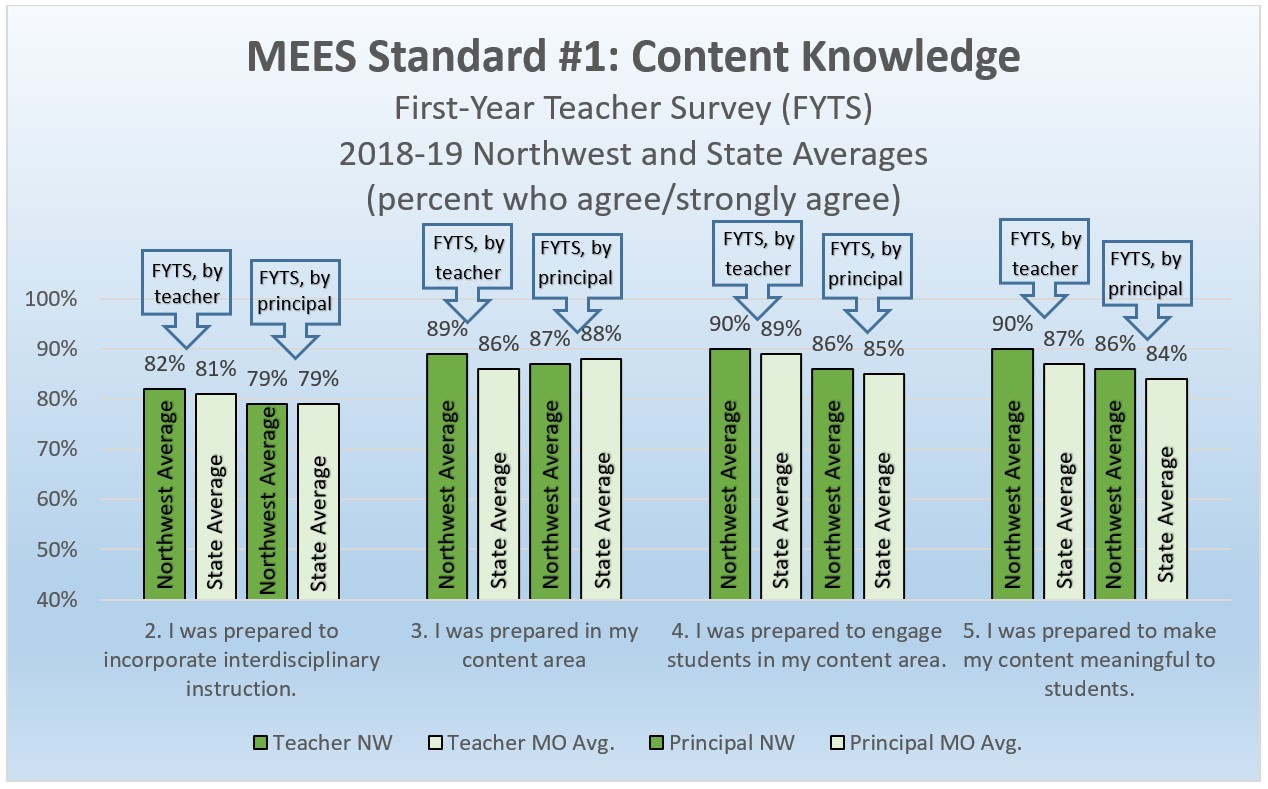
Trends in these data over the past four years, as shown in the two charts that follow, have remained relatively consistent overall for the four years in which Missouri has been administering the FYTS. Northwest's most recent data for the past year compares favorably to data from four years ago, 2015-16. However, though the data in 2019-20 remains strong when compared with state numbers, these data also show a slight overall downward trend from 2016-17 and 2017-18 data, and this slight downward trend is consistent with other questions from the FYTS survey questions evaluated and analyzed in later sections of this report.
These trends are not alarming, but they reveal some of the difficulties inherent in transitioning to the new programs: as we transition, some resources (including faculty) have been devoted to both programs simultaneously. This may have limited the effectiveness of the program, as faculty split between two programs have more to do and many have been able to provide the support needed to provide a remarkable experience; it was "only" strong and impactful, not optimal. Further, because these surveys are based on completers' perceptions of the program, these slight downward trends may suggest a slight morale dip in completers from the old programs as Northwest works to finish their programs. Because of this data (and the accreditation self-study process), Northwest is taking steps, to be discussed in more detail in the "Conclusion: Findings and Recommendations" section of this report, in the 2019-20 academic year to provide a stronger finish to the old programs. In 2021-22, the first completers from the newly redesigned undergraduate programs and their principals will take the FYTS surveys and Northwest looks forward to comparing their data to these current completers' data.
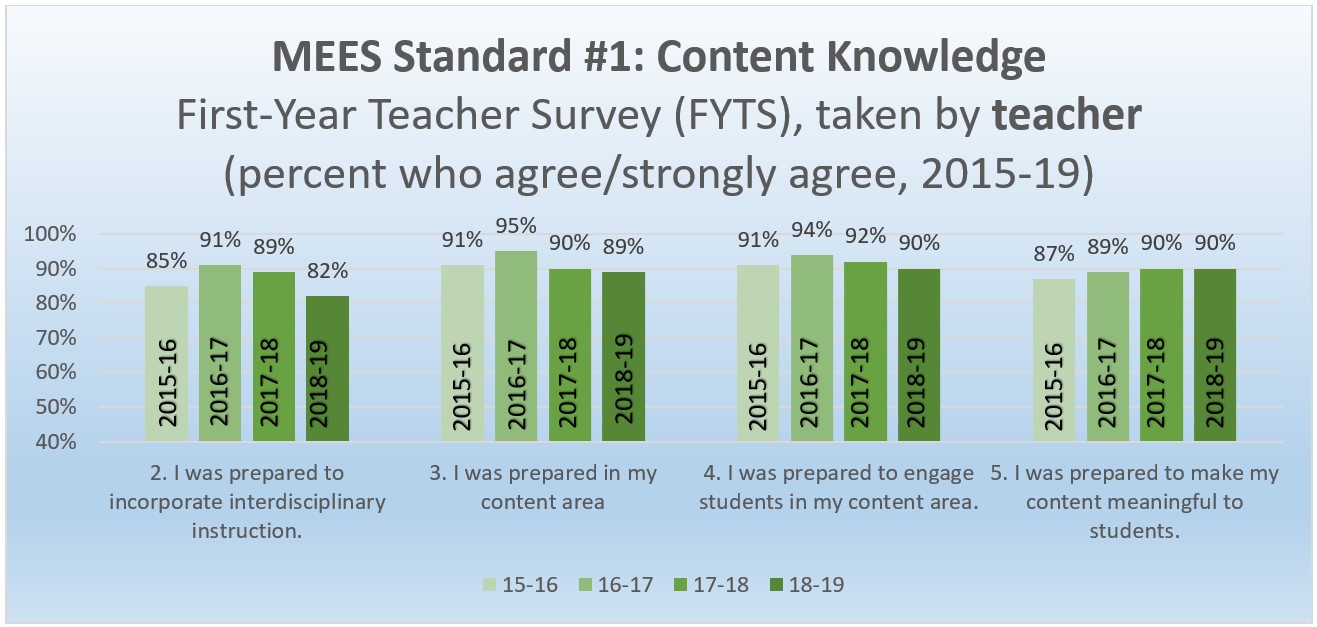
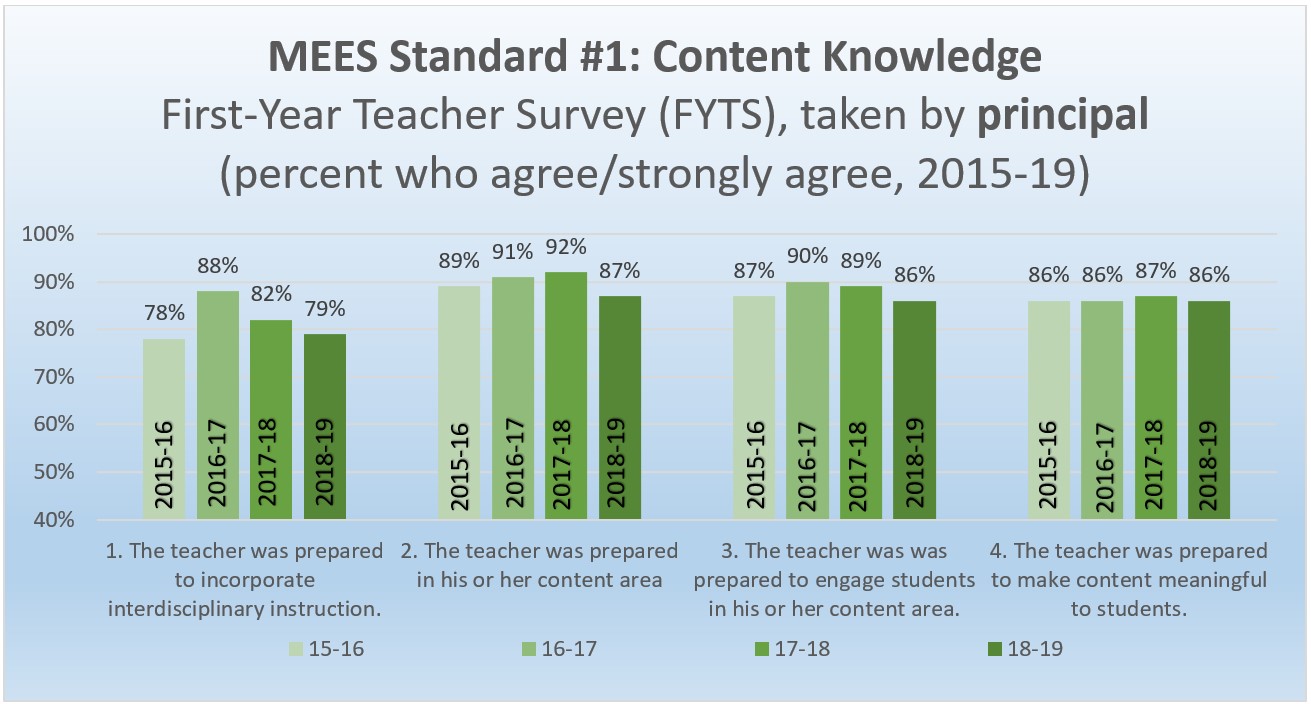
FYTS data regarding MEES 2-9 are included in later sections in this report:
A note about these sources of data and their impact on quality assurance at Northwest" FYTS data are one of several points of information used systemically to guide continuous improvement. Several routine analyses take place to inform the collective understanding of the impact of the program on candidate and P-12 learning. These include, but are not limited to: 1) student evaluation of teaching-including class surveys on each course to evaluate professors' impact in the classroom; 2) annual performance reporting from DESE; 3) feedback from Advisory Board members; 4) faculty and staff receive and analyze data at Unit Retreats; 5) conversations with area principal and superintendent groups at monthly meetings and Professional Advisory Board meetings; and, 6) feedback from district human resources professionals at Mock Interview Day, teacher placement events, and recruitment fairs on campus.
Additionally, Northwest uses evidence and data to arrive at an understanding of the impact of our programs in several consistent ways. First, the Dean of the School of Education meets weekly with the School of Education Leadership Team and regularly discusses qualitative and quantitative data to spur improvement. Additionally, the Unit has regularly-scheduled meetings of the department, as well as the Professional Education Unit Quality Assurance Team (QAT), Council on Teacher Education (COTE), and Professional Development at Planning and Development Days each fall and spring for the School of Education. We use data and information at the semi-annual Professional Education Unit Retreat, which is co-led by our Assessment Director and Assistant Director of Accreditation and Assessment and the Dean of the School of Education to provide time and space to make sense of qualitative and quantitative data for the purpose of making strategic decisions to advance the well-being of the students, staff, and faculty who work on programs preparing teachers and leaders. Finally, the Dean, Assistant Director of Teacher Education, and Associate Director of Accreditation and Assessment meet weekly to plan strategy and professional development using available data to drive continuous conversation, gauge opportunities to learn and grow, and seek quality assurance processes to benefit students, faculty, staff, the university, and school partners.